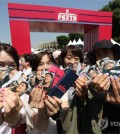- California Assembly OKs highest minimum wage in nation
- S. Korea unveils first graphic cigarette warnings
- US joins with South Korea, Japan in bid to deter North Korea
- LPGA golfer Chun In-gee finally back in action
- S. Korea won’t be top seed in final World Cup qualification round
- US men’s soccer misses 2nd straight Olympics
- US back on track in qualifying with 4-0 win over Guatemala
- High-intensity workout injuries spawn cottage industry
- CDC expands range of Zika mosquitoes into parts of Northeast
- Who knew? ‘The Walking Dead’ is helping families connect
Aerial tanker carrying virus-hit Cheonghae unit heads home from Africa
A South Korean aerial tanker carrying members of the virus-hit Cheonghae unit departed Africa on Monday to bring the troops home from an overseas anti-piracy mission, the defense ministry said, after 247 of them tested positive for the new coronavirus in the worst-ever mass infection among service members.
The military sent two KC-330 multirole aerial tankers to Africa the previous day to bring back all the members of the 301-strong unit under an operation codenamed “Mission Oasis,” after 82 percent of them were found to be infected with COVID-19.
One of the aircraft departed a local airport at 7:25 p.m. (Seoul time), with the other to follow suit. They are expected to arrive home Tuesday.
After the first six COVID-19 cases were reported last week, virus tests on all of its members found that a total of 247 have contracted the virus.
“Test results on all 301 crewmembers of the unit showed that 247 tested positive and 50 negative. The samples of four individuals were undecipherable,” the JCS said in a release.
As of Monday morning, 16 were at local hospitals for treatment, and the remainder were in isolation on their destroyer, Munmu the Great.
Upon arrival, they will be sent to medical facilities for treatment after undergoing another round of COVID-19 tests, the officials said, adding the military, in close cooperation with health authorities, is preparing measures to ensure their safety.
Their destroyer will be piloted back home by a team of service members who left the country Sunday aboard the tankers.
Their return will be about a month ahead of the original schedule, which will mark the first early return of the contingent since the unit was first deployed in 2009. The troops are rotated every six months for an anti-piracy mission in the Gulf of Aden off the coast of Somalia and around the Strait of Hormuz.
A replacement contingent is on its way after departing for Africa last month to take over the mission.
The case marked the worst ever cluster infection among service members since the military reported its first COVID-19 case in February last year.
Criticism has mounted over the military’s poor responses to the pandemic.
Contact tracing is under way, but the infections appeared to have begun after the vessel was docked at an African port from June 28-July 1 to load supplies.
One sailor showed symptoms of a cold the day after the destroyer had left the port. However, he was found to have been given only cold medicine without undergoing a virus test.
After a dozen others developed similar symptoms the following week, authorities conducted COVID-19 tests with rapid testing kits, instead of more accurate PCR tests, which all produced negative results.
Samples from six people were later sent to a nearby country for PCR tests, and they all were confirmed to have been infected Tuesday, according to the officials.
The authorities have also come under fire for not actively seeking ways to inoculate the unit members. None of the troops have been vaccinated as they left South Korea just before the country began its inoculation campaign.
“We’ve seen some difficulties in sending vaccines by aircraft and in other distribution procedures,” Jeong Eun-kyeong, director of the Korea Disease Control and Prevention Agency (KDCA), told a regular briefing. “We also need to consider if we can ensure the safety of vaccination aboard a vessel.”
Vaccines by Pfizer and Moderna should be delivered and stored in ultra-cold conditions, which require specialized freezers and facilities. The destroyer is not equipped with such facilities, officials said.
AstraZeneca’s and Janssen’s vaccines are given only for those aged 30 and older due to concerns about side effects such as blood clots. Many of the Cheonghae unit members are in their 20s, according to defense ministry officials.
They also said there could be difficulties in the unit’s response if serious side effects occur.
“We will review and supplement military guidelines on the management of troops overseas, including how to respond to infectious diseases,” a defense ministry official said.
Currently, around 73 percent of some 1,300 troops on overseas missions have been fully vaccinated, including all members of the new batch of the Cheonghae unit, according to the ministry.












